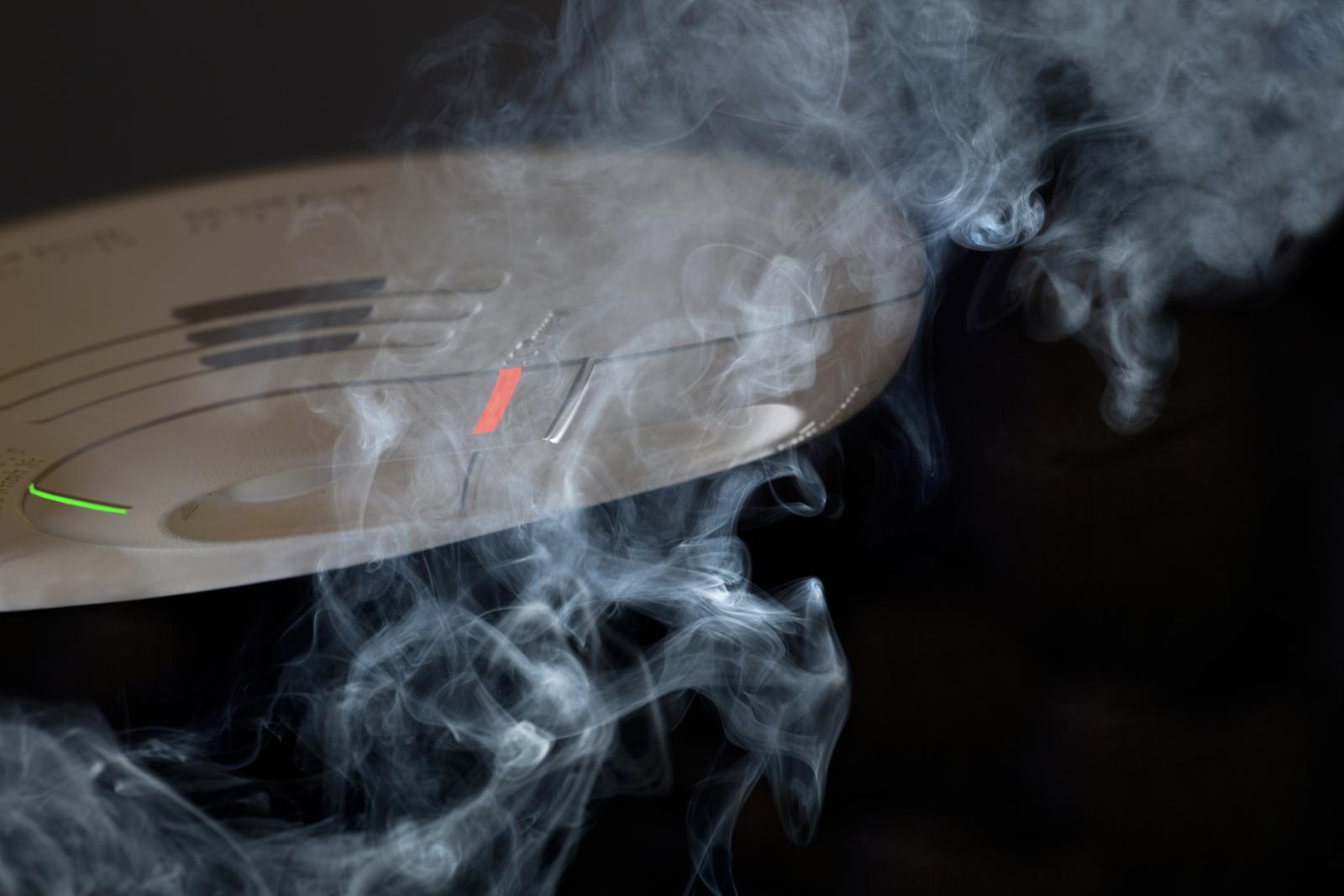-
Press Release
October 11, 2024
UL Research Institutes, UL Standards & Engagement and UL Solutions Highlight New Smoke Alarm and Detector Requirements During Fire Prevention Week

The updates help eliminate cooking nuisance alarms and enhance the detection of fires involving new construction materials
NORTHBROOK, Ill. (Oct. 11, 2024) — UL Research Institutes, UL Standards & Engagement and UL Solutions (NYSE:ULS) are highlighting updated smoke detector requirements in recognition of Fire Prevention WeekTM, underscoring the important ways these devices address deadly new fire risks and help improve safety in homes and businesses.
The theme for 2024 Fire Prevention Week is “Smoke alarms: Make them work for you!” and focuses on educating everyone about the critical importance of having working smoke alarms in their homes. This comes as smoke alarms and detectors that meet important new UL requirements become available on store shelves and consumer sites online.
UL Research Institutes, UL Standards & Engagement and UL Solutions are three independent organizations with a shared mission of working for a safer world.
These new updates require certified alarms and detectors available to the public to be more sensitive. In response, a cooking nuisance test was created, helping eliminate nuisance alarms triggered while cooking — a common reason people disable alarms — and detecting faster-burning fires associated with materials found in today’s homes.
"We have been certifying smoke alarms for more than four decades, and this is another significant step in improving the protection they provide,” said Dwayne Sloan, technical director of the Built Environment group at UL Solutions. “With these new requirements in place and new testing capabilities added to our laboratories, our smoke alarm testing work will help further improve fire safety for homes and businesses around the world."
The new requirements are part of the 8th edition of UL 217, the Standard for Safety of Smoke Alarms, effective for alarms being tested as of June 30.
The new alarms and detectors that meet UL 217 requirements use advanced detection sensing technology or a combination of several sensors and custom algorithms to better detect flaming and smoldering fires, particularly those involving polyurethane foam, a material commonly found in today’s household furniture and mattresses.
The technology reduces the incidence of nuisance alarms triggered by cooking, because the technology differentiates types of smoke. Silencing nuisance alarms is often cited as the reason for removing a battery or turning off a hardwired smoke alarm, at times with deadly consequences.
“It is essential to have properly installed and functioning smoke alarms or detectors where we live, work and play,” said Diane Haithcock, director of standards programs at UL Standards & Engagement. “The updated requirements for these safety devices can help save lives and protect property in today’s living and working environments.”
UL Standards & Engagement mobilizes science into action through advocacy and standards, such as UL 217. UL Research Institutes advances safety science by sensing risk and conducting rigorous independent research that accelerates discoveries. UL Solutions brings safety science to life by helping businesses confidently innovate and solve pressing challenges.
Smoke alarms provide the earliest warning of a home fire to inhabitants — critical in light of research findings by UL Research Institutes’ Fire Safety Research Institute (FSRI), indicating that people currently have an average of three minutes or less to exit the home following activation of a smoke alarm.1
“Forty years ago, people had 17 minutes to escape their homes in the event of a fire,” said Steve Kerber, vice president and executive director of the FSRI at UL Research Institutes. “Today, fire is faster due to synthetic materials in furnishings and building materials and more open floor plans, leaving people with less time to escape. Every second counts.”
Fire Prevention Week is observed each year in October.
Learn more about smoke alarms.
1. Underwriters Laboratories. 2021. “Close Before You Doze.” Close Your Door. Last modified November 21, 2021.https://closeyourdoor.org/#facts
About UL Research Institutes
UL Research Institutes is a nonprofit research organization dedicated to advancing public safety through scientific discovery. Since 1894, our research has advanced our mission toward a safer, more secure and sustainable future. Focused on global risks from fire mitigation and air quality to safe energy storage and digital privacy, we conduct rigorous independent research, analyze safety data and partner with experts to uncover and act on existing and emerging risks to human safety. Discover more at UL.org.
About UL Standards & Engagement
UL Standards & Engagement is a nonprofit organization that translates safety science into action through standards development, partnerships and advocacy. Since 1903, we have developed nearly 1,700 standards and guidance documents for products ranging from fire doors to autonomous vehicles. ULSE enables innovation and grows trust by convening experts and informing policymakers and regulators as we work toward a safer, more secure and sustainable future. Visit ulse.org for more information.
About UL Solutions
A global leader in applied safety science, UL Solutions (NYSE: ULS) transforms safety, security and sustainability challenges into opportunities for customers in more than 110 countries. UL Solutions delivers testing, inspection and certification services, together with software products and advisory offerings, that support our customers’ product innovation and business growth. The UL Mark serves as a recognized symbol of trust in our customers’ products and reflects an unwavering commitment to advancing our safety mission. We help our customers innovate, launch new products and services, navigate global markets and complex supply chains, and grow sustainably and responsibly into the future. Our science is your advantage.
Media contacts:
Kathy Fieweger
UL Solutions
Kathy.Fieweger@ul.com
Kristen Delphos
UL Research Institutes
Kristen.Delphos@UL.org
Katie Denis
UL Standards & Engagement
Katie.Denis@UL.org